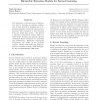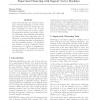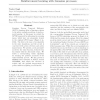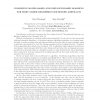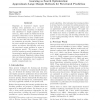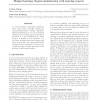ICML
2005
IEEE
16 years 1 months ago
2005
IEEE
The integration of diverse forms of informative data by learning an optimal combination of base kernels in classification or regression problems can provide enhanced performance w...
94
Voted
ICML
2005
IEEE
16 years 1 months ago
2005
IEEE
This paper studies the aggregation of predictions made by tree-based models for several perturbed versions of the attribute vector of a test case. A closed-form approximation of t...
54
Voted
ICML
2005
IEEE
16 years 1 months ago
2005
IEEE
We propose a new kernel function for attributed molecular graphs, which is based on the idea of computing an optimal assignment from the atoms of one molecule to those of another ...
81
Voted
ICML
2005
IEEE
16 years 1 months ago
2005
IEEE
Supervised clustering is the problem of training a clustering algorithm to produce desirable clusterings: given sets of items and complete clusterings over these sets, we learn ho...
89
Voted
ICML
2005
IEEE
16 years 1 months ago
2005
IEEE
Properties of ensemble classification can be studied using the framework of Monte Carlo stochastic algorithms. Within this framework it is also possible to define a new ensemble c...
113
Voted
ICML
2005
IEEE
16 years 1 months ago
2005
IEEE
Gaussian Process Temporal Difference (GPTD) learning offers a Bayesian solution to the policy evaluation problem of reinforcement learning. In this paper we extend the GPTD framew...
100
Voted
ICML
2005
IEEE
16 years 1 months ago
2005
IEEE
T ORDER REGRESSION (EXTENDED ABSTRACT) Kurt Driessensa Saso Dzeroskib a Department of Computer Science, University of Waikato, Hamilton, New Zealand (kurtd@waikato.ac.nz) b Departm...
96
Voted
ICML
2005
IEEE
16 years 1 months ago
2005
IEEE
This paper presents a search algorithm for finding functions that are highly correlated with an arbitrary set of data. The functions found by the search can be used to approximate...
112
click to vote
ICML
2005
IEEE
16 years 1 months ago
2005
IEEE
Mappings to structured output spaces (strings, trees, partitions, etc.) are typically learned using extensions of classification algorithms to simple graphical structures (eg., li...
ICML
2005
IEEE
16 years 1 months ago
2005
IEEE
In non-cooperative multi-agent situations, there cannot exist a globally optimal, yet opponent-independent learning algorithm. Regret-minimization over a set of strategies optimiz...
